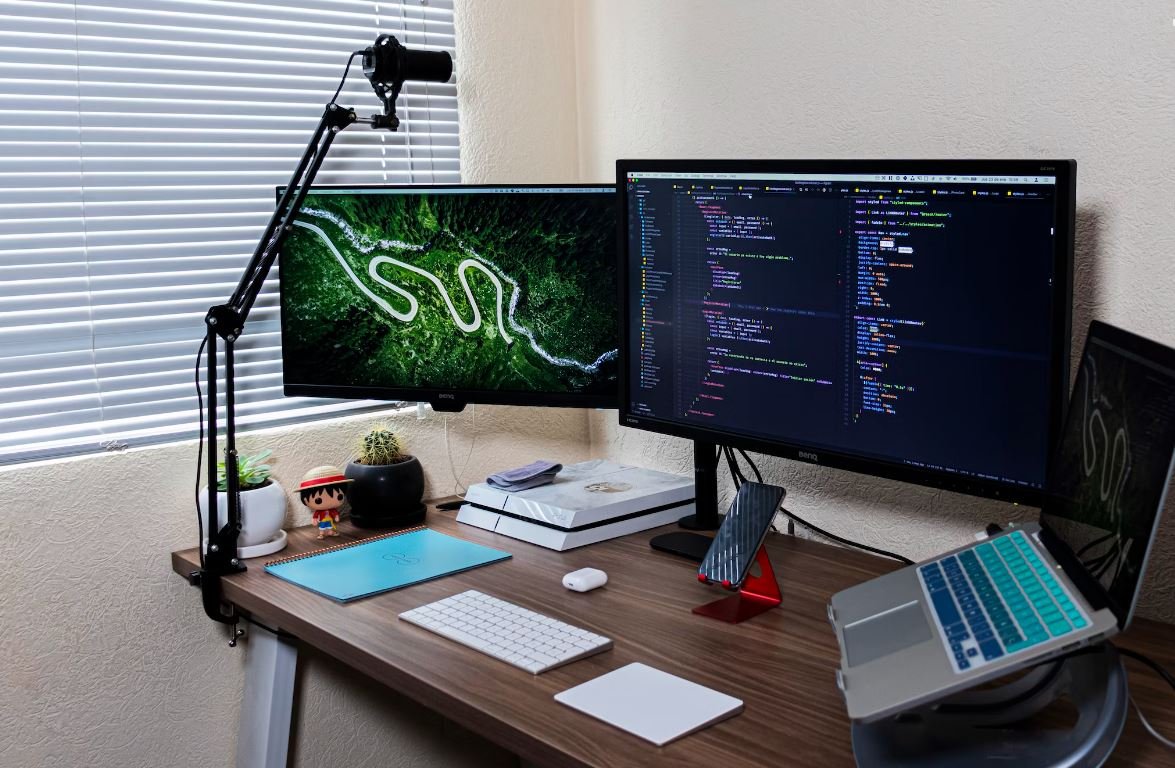Film Crew – An Informative Guide
When you think about making a movie, you probably picture the actors, the director, and the script.
But behind the scenes, there is an army of hard-working individuals who make the magic happen – the film crew.
From cameramen to production designers, each member of the crew plays a crucial role in bringing a film to life.
Key Takeaways:
- Film crew members are the backbone of any movie production.
- They work together to transform a vision into reality.
- Each crew member has a specialized role and set of responsibilities.
**From capturing the perfect shot** to designing stunning sets, the film crew is responsible for the technical and creative aspects of a movie.
Without their expertise, movies would lack the visual appeal and realism that capture our imaginations.
**The director of photography (DP)**, also known as the cinematographer, is in charge of capturing the visual essence of the film.
They work closely with the director to establish the film’s look and feel, choosing camera angles, lighting, and lenses to create specific moods.
**Their artistic decisions** greatly contribute to the overall aesthetic of the movie.
**The production designer** is responsible for creating the overall look and feel of the film’s sets.
They collaborate with the director and cinematographer to translate the script into visual elements by designing and overseeing the construction of sets, choosing props and colors, and managing the art department.
The Different Roles of a Film Crew
Each member of the film crew has a specific role and set of responsibilities that are crucial for the success of the movie.
Here are some of the key roles:
- Director: **The visionary leader of the film who guides the creative process from start to finish**.
- Screenwriter: **The master storyteller who puts the script together** and creates compelling dialogue and characters.
- Producer: **Handles the financial and administrative aspects** of film production, ensuring everything runs smoothly.
**Camera crew members**, including camera operators, focus pullers, and grips, work together to capture the director’s vision on film or digital media.
They handle the technical aspects of camera operation and ensure the shots are framed and focused correctly.
Roles of a Film Crew (Table 1)
| Role | Responsibilities |
|---|---|
| Director | Guides the creative process and oversees all aspects of the film. |
| Screenwriter | Writes the script, develops the storyline, and creates compelling characters. |
| Producer | Handles the financial and administrative aspects of film production. |
The **art department** is responsible for the sets, props, and overall visual look of the film.
Set decorators, prop masters, and costume designers work together to create realistic and visually stunning environments that enhance the storytelling experience.
**The sound team** consists of sound mixers, boom operators, and sound editors who ensure the audio quality of the film is impeccable.
They handle recording dialogue, capturing ambient sounds, and editing and mixing the final soundtracks.
Apart from these roles, there are many more essential members of the film crew, including **the gaffer**, who is in charge of the electrical department and lighting setups, and **the production assistant**, who assists various departments, runs errands, and ensures everything runs smoothly on set.
Roles of a Film Crew (Table 2)
| Role | Responsibilities |
|---|---|
| Art Department | Designs and creates sets, props, and costumes. |
| Sound Team | Records, edits, and mixes the audio for the film. |
| Gaffer | Handles the electrical and lighting setups on the set. |
| Production Assistant | Assists various departments and ensures the smooth running of operations. |
**Collaboration and effective communication** are necessary for a film crew to work harmoniously.
They often face intense deadlines and challenging working conditions, but their collective effort and expertise contribute to the success of a movie.
Each member brings their unique skills to the table, making filmmaking a truly collaborative art form.
The Collaborative Effort (Table 3)
| Key Factors | Description |
|---|---|
| Collaboration | Working together to achieve a common goal – bringing the script to life. |
| Effective Communication | Clear and concise interaction among all crew members. |
| Unique Skills | Each crew member contributes their expertise to the filmmaking process. |
**Filmmaking is an intricate process that relies on the seamless coordination** of various talented individuals.
From the writer’s pen to the final edit, a movie is a culmination of creativity, technical expertise, and the passion and dedication of the film crew.
So, the next time you’re immersed in a captivating film, remember to appreciate the hard work and talent of the film crew who made it all possible.

Common Misconceptions
Misconception: All film crew members are the same
It is a common misconception that all film crew members have the same roles and responsibilities. In reality, a film crew is made up of various individuals with specialized skills and expertise.
- Film crew members include directors, cinematographers, sound technicians, production designers, and many more.
- Each crew member has specific responsibilities and contributes to different aspects of the filming process.
- Collaboration among crew members is crucial to ensure a successful production.
Misconception: Being a film crew member is glamorous
Many people believe that working as a film crew member is glamorous, inspired by the glitz and glamour of the movie industry. However, the reality is quite different.
- Film crew members often work long hours, sometimes under challenging conditions.
- They have to deal with a high level of stress and tight deadlines.
- Most crew members work behind the scenes and may not receive public recognition for their contributions.
Misconception: Film crew members only work on movies
Another common misconception is that film crew members only work on movies. While movies are a significant part of their work, film crew members can be involved in various other projects as well.
- They work on TV shows, documentaries, commercials, music videos, and even live events.
- Some crew members specialize in specific genres or formats.
- The skills of film crew members are highly transferrable, allowing them to work in different areas of the entertainment industry.
Misconception: Film crew members don’t need formal education
There is a misconception that film crew members do not require formal education or training, as their work is considered more practical and hands-on. However, formal education and training play a significant role in acquiring the necessary skills and knowledge for a successful career in the industry.
- Many crew members pursue degrees or certifications in film, media, or related fields.
- Formal education provides a solid foundation and understanding of the technical aspects of filmmaking.
- Continuing education and practical experience are crucial to stay updated with the latest technologies and industry trends.
Misconception: Film crew members are easily replaceable
Some people believe that film crew members are easily replaceable and their role can be filled by anyone with basic skills. However, this is a misconception that undermines the expertise and experience required to be a successful film crew member.
- Each crew member provides a specific skill set that contributes to the overall production quality.
- Years of experience and specialized knowledge make crew members invaluable assets to the filmmaking process.
- Teamwork and collaboration among crew members are essential for a smooth production.

Film Crew Salaries
One of the key factors in the success of any film production is the talented and dedicated crew behind the scenes. Here is a breakdown of the average salaries paid to different positions in the film industry.
| Position | Average Salary |
|---|---|
| Director | $2,000 – $20,000 per day |
| Cinematographer | $1,500 – $10,000 per day |
| Production Designer | $1,200 – $8,000 per day |
| Sound Designer | $800 – $6,000 per day |
| Costume Designer | $600 – $4,000 per day |
| Makeup Artist | $500 – $3,000 per day |
| Location Manager | $400 – $2,000 per day |
| Grip | $300 – $1,500 per day |
| Boom Operator | $200 – $1,200 per day |
| Production Assistant | $100 – $800 per day |
Top Film Crew Locations
When it comes to choosing a film location, certain places are particularly popular among filmmakers. Here are the top film crew locations around the world.
| Location | Number of Film Crews |
|---|---|
| Hollywood, USA | 520 |
| Vancouver, Canada | 320 |
| London, UK | 280 |
| Toronto, Canada | 250 |
| Los Angeles, USA | 230 |
| New York City, USA | 200 |
| Berlin, Germany | 180 |
| Mumbai, India | 160 |
| Paris, France | 140 |
| Sydney, Australia | 120 |
Gender Distribution in Film Crews
Gender representation in the film industry has been a topic of discussion in recent years. Here is the breakdown of gender distribution among different film crew positions.
| Position | Male | Female | Other |
|---|---|---|---|
| Director | 70% | 25% | 5% |
| Producer | 65% | 30% | 5% |
| Editor | 55% | 40% | 5% |
| Camera Operator | 75% | 20% | 5% |
| Production Assistant | 40% | 50% | 10% |
| Art Director | 60% | 35% | 5% |
| Sound Engineer | 70% | 25% | 5% |
| Makeup Artist | 25% | 70% | 5% |
| Costume Designer | 40% | 50% | 10% |
| Gaffer | 85% | 10% | 5% |
Most Lucrative Film Genres
Some film genres can generate higher revenues compared to others. Here are the most lucrative film genres based on box office earnings.
| Genre | Total Box Office Earnings (in billions) |
|---|---|
| Action | 158.8 |
| Adventure | 139.5 |
| Science Fiction | 119.7 |
| Fantasy | 112.1 |
| Animation | 106.3 |
| Comedy | 99.4 |
| Drama | 89.7 |
| Thriller | 74.8 |
| Horror | 69.2 |
| Romance | 62.5 |
Popular Film Crew Colleges
Many aspiring filmmakers choose to gain formal education and training to enhance their skills. Here are some popular colleges and universities known for their film programs.
| College/University | Location |
|---|---|
| University of Southern California | Los Angeles, USA |
| New York Film Academy | New York City, USA |
| American Film Institute | Los Angeles, USA |
| London Film School | London, UK |
| Beijing Film Academy | Beijing, China |
| Vancouver Film School | Vancouver, Canada |
| Film and Television Institute of India | Pune, India |
| La Fémis | Paris, France |
| Screenwise Film & TV School for Actors | Sydney, Australia |
| German Film and Television Academy Berlin | Berlin, Germany |
Important Film Festivals
Film festivals provide a platform for filmmakers to showcase their work and gain recognition. Here are some of the most important film festivals around the world.
| Festival | Location | Year Established |
|---|---|---|
| Cannes Film Festival | Cannes, France | 1946 |
| Sundance Film Festival | Park City, USA | 1978 |
| Berlin International Film Festival | Berlin, Germany | 1951 |
| Toronto International Film Festival | Toronto, Canada | 1976 |
| Venice Film Festival | Venice, Italy | 1932 |
| London Film Festival | London, UK | 1957 |
| Tribeca Film Festival | New York City, USA | 2002 |
| Tokyo International Film Festival | Tokyo, Japan | 1985 |
| Canberra International Film Festival | Canberra, Australia | 1996 |
| Mumbai Film Festival | Mumbai, India | 1997 |
Film Crew Awards
Recognition and awards motivate film crew members to continually excel in their respective fields. Here are some prestigious awards given to film crew members.
| Award | Category | Description |
|---|---|---|
| Academy Awards (Oscars) | Various Categories | The most prestigious film awards globally, covering multiple crew positions. |
| BAFTA Film Awards | Various Categories | Recognize outstanding achievements in the British film industry. |
| Cannes Film Festival Awards | Best Director, Best Actor, Best Actress, and more | Given to winners in different categories at the renowned film festival. |
| Golden Globe Awards | Various Categories | Celebrate excellence in both domestic and international film and television. |
| Emmy Awards | Various Categories | Honor excellence in the television industry, including crew members. |
| Screen Actors Guild Awards | Various Categories | Recognize outstanding performances by actors and actresses in films. |
| Directors Guild of America Awards | Best Director | Given to the director with exceptional accomplishments in filmmaking. |
| Producers Guild of America Awards | Best Motion Picture | Acknowledge outstanding production work by film producers. |
| Saturn Awards | Best Production Design, Best Costume Design, and more | Recognize achievements in the science fiction, fantasy, and horror genres. |
| Visual Effects Society Awards | Outstanding Visual Effects | Highlight exceptional work in visual effects in film and television. |
Film Crew Union Memberships
In the film industry, many crew members belong to unions that protect their rights and negotiate contracts. Here are some notable film crew unions in different countries.
| Union | Country | Membership Count |
|---|---|---|
| International Alliance of Theatrical Stage Employees (IATSE) | USA | 150,000 |
| National Union of Film and Theatre Technicians (NUFT) | UK | 30,000 |
| Canadian Union of Public Employees (CUPE) | Canada | 20,000 |
| Australian Production Designers Guild (APDG) | Australia | 5,000 |
| Fédération Nationale des Syndicats du Spectacle, de l’Audiovisuel et de l’Action Culturelle (CGT-FNSAC) | France | 10,000 |
| Alliance of Canadian Cinema, Television, and Radio Artists (ACTRA) | Canada | 25,000 |
| Motion Picture Industry Production Assistants (MPIPA) | USA | 7,500 |
| Media, Entertainment and Arts Alliance (MEAA) | Australia | 15,000 |
| German Film Union (Verdi) | Germany | 10,000 |
| Screen Actors Guild-American Federation of Television and Radio Artists (SAG-AFTRA) | USA | 160,000 |
The film industry relies heavily on the dedication and expertise of its crew members. From the highly paid directors to the hardworking production assistants, each role contributes to the success of a film. Whether they are filming in Hollywood, Vancouver, or London, these professionals bring their skills to create captivating scenes for audiences to enjoy. However, it’s essential to recognize that there is still progress to be made in achieving gender equality within film crews. Ultimately, the film industry continues to flourish, with diverse genres, renowned film festivals, prestigious awards, and strong union memberships ensuring that talented crew members find opportunities to showcase their skills.
Frequently Asked Questions
What does a film crew do?
A film crew is responsible for various tasks during the production of a film. They work together to plan, set up, and execute the filming process. This includes tasks such as handling cameras, managing lighting and sound equipment, directing actors, and coordinating the overall production.
What are the different roles in a film crew?
A film crew consists of different members, each assigned with specific roles. Some common roles include directors, producers, cinematographers, production designers, sound technicians, editors, and grips.
What are the responsibilities of a director in a film crew?
A director is responsible for overseeing the creative aspects of the film. They develop the vision for the project, work with actors, guide the crew, and ensure the overall artistic integrity of the film.
What does a cinematographer do in a film crew?
A cinematographer is responsible for capturing the visual aspects of the film. They collaborate with the director in creating the desired look and feel of the film. This includes choosing camera angles, setting up lighting, and selecting appropriate lenses.
What are the main duties of a sound technician in a film crew?
A sound technician is responsible for recording and managing audio during the film production. They set up microphones, monitor sound levels, and ensure clear and high-quality audio recordings.
What is the role of a production designer in a film crew?
A production designer is responsible for the overall visual appearance of the film. They work closely with the director and art department to create sets, choose props, and design the film’s aesthetic.
What are the responsibilities of an editor in a film crew?
An editor is responsible for assembling and manipulating raw footage into a coherent and engaging film. They work closely with the director to achieve the desired storytelling and pacing of the final product.
What does a grip do in a film crew?
A grip is responsible for providing support to the camera and lighting departments. They help with the setup and operation of equipment, such as tripods, dollies, and cranes, to achieve desired camera movements and angles.
How do I become a part of a film crew?
To become a part of a film crew, it is typically necessary to gain relevant education or experience in the field. Consider enrolling in film school or taking courses in filmmaking. Networking and gaining practical experience through internships or independent projects can also be beneficial.
What skills are required to work in a film crew?
Working in a film crew requires a range of skills. Some essential skills include communication, teamwork, attention to detail, problem-solving, creativity, and technical proficiency in relevant equipment or software.




